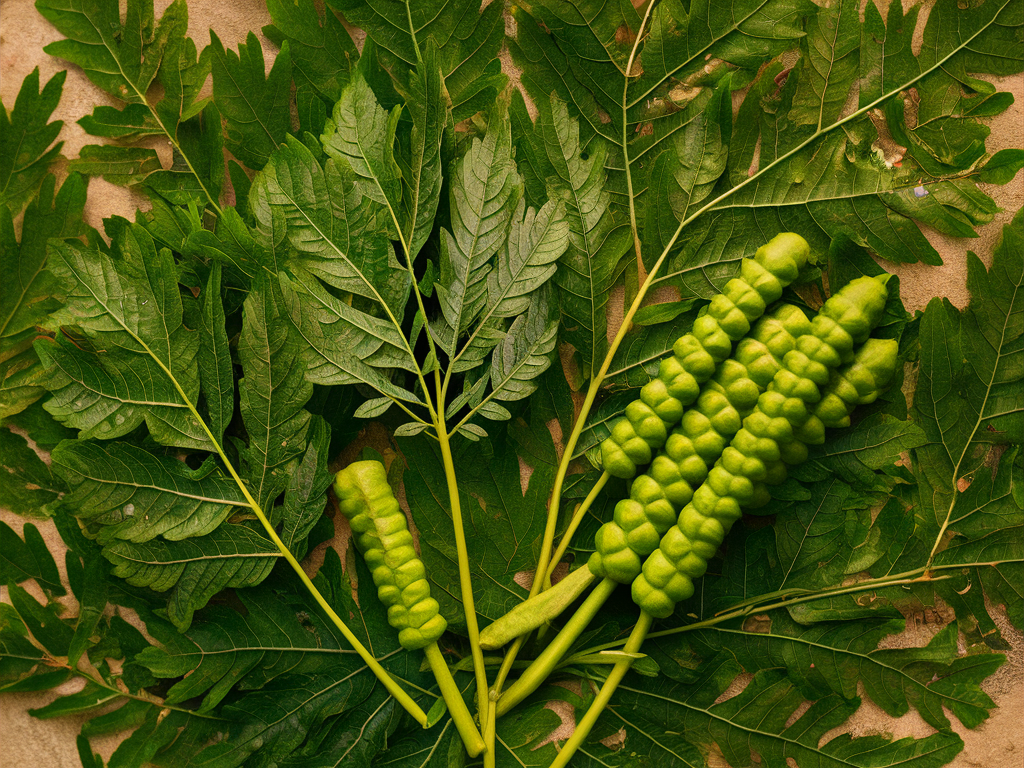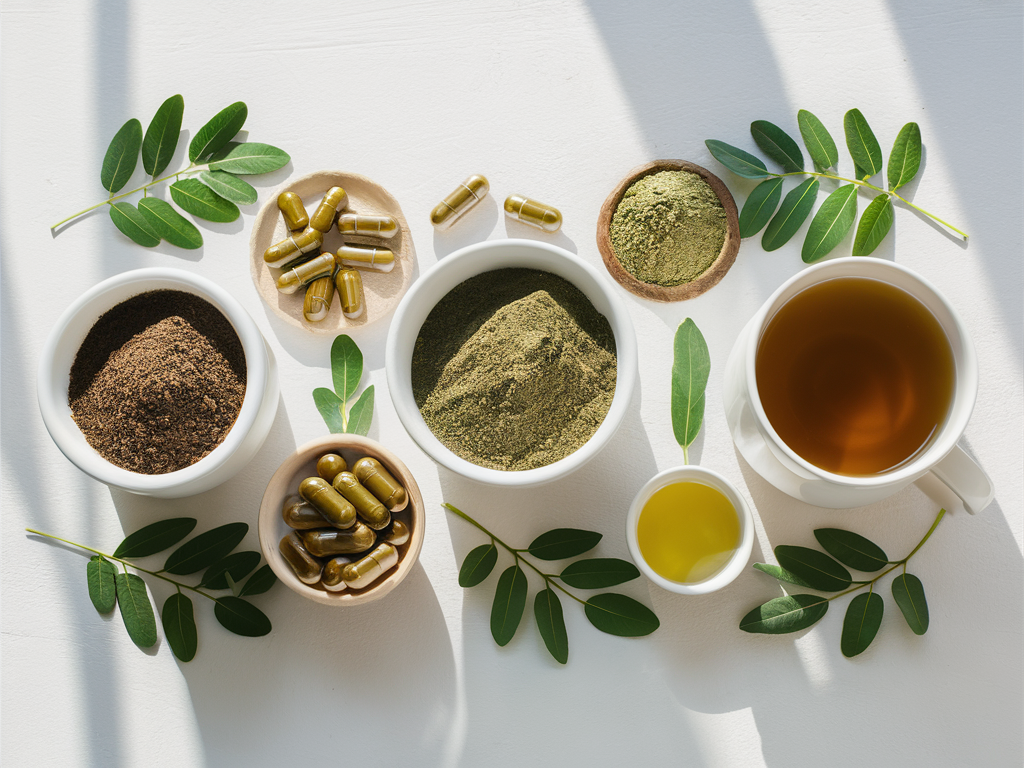Moringa oleifera, commonly known as the “miracle tree,” has gained worldwide recognition as one of nature’s most nutritious plants. This extraordinary superfood has been utilized for centuries across various cultures for its remarkable medicinal properties and exceptional nutritional value. Native to parts of Africa and Asia, particularly the Indian subcontinent, the Moringa tree thrives even in harsh conditions and provides nourishment in regions where food security is challenging. Today, modern science is validating what traditional healers have known for generations: Moringa offers an impressive array of health benefits that can transform your wellness journey naturally.
From its nutrient-dense leaves to its antioxidant-rich seeds and oil, every part of this remarkable tree contributes to its superfood status. Let’s explore the 15 incredible health benefits that make Moringa a must-have addition to your health regimen.

1. Exceptional Nutritional Profile
Moringa leaves are nutritional powerhouses that rival many conventional superfoods. Gram for gram, they contain:
- 7 times more vitamin C than oranges
- 4 times more vitamin A than carrots
- 4 times more calcium than milk
- 3 times more potassium than bananas
- 2 times more protein than yogurt
What makes Moringa truly extraordinary is its complete amino acid profile—containing all nine essential amino acids the human body cannot produce on its own. This makes it a complete protein source, particularly valuable for plant-based diets. Its micronutrient density includes significant amounts of vitamins B1, B2, B3, and E, alongside minerals like iron, zinc, magnesium, and phosphorus.
When compared to other popular superfoods like kale, spirulina, or acai berries, Moringa consistently demonstrates superior nutritional density across multiple essential nutrients. This comprehensive nutritional profile makes it particularly valuable in addressing multiple nutritional deficiencies simultaneously.
2. Powerful Antioxidant Properties
Oxidative stress, caused by an imbalance of free radicals and antioxidants in the body, contributes to aging and numerous chronic diseases. Moringa leaves contain an impressive array of antioxidant compounds, including:
- Quercetin: Known to help lower blood pressure and fight inflammation
- Chlorogenic acid: Also found in coffee, known for its blood sugar-regulating effects
- Vitamin C: A powerful antioxidant that boosts immune function
- Beta-carotene: Converts to vitamin A in the body and protects eye health
- Rutin: Strengthens blood vessels and promotes circulation
Research published in the Journal of Food Science and Technology has demonstrated that Moringa leaf extract exhibits higher antioxidant activity than many common fruits and vegetables. These antioxidants neutralize free radicals, protecting cells from oxidative damage, supporting cellular repair mechanisms, and potentially slowing age-related deterioration at the cellular level.
3. Anti-inflammatory Benefits
Chronic inflammation is recognized as a significant contributor to numerous modern diseases, including heart disease, cancer, arthritis, and metabolic disorders. Moringa contains bioactive compounds with potent anti-inflammatory properties, primarily isothiocyanates, flavonoids, and phenolic acids.
A 2019 study published in the International Journal of Molecular Sciences demonstrated that Moringa leaf extract significantly reduced inflammatory markers in laboratory studies. The isothiocyanate compounds, particularly moringin, inhibit the activation of inflammatory pathways in the body, potentially reducing inflammation at its source.
For individuals suffering from inflammatory conditions like arthritis, regular consumption of Moringa may help manage symptoms by reducing underlying inflammation. Clinical observations have shown promising results in alleviating joint pain and improving mobility when Moringa supplements are incorporated into treatment plans.
4. Blood Sugar Regulation
Maintaining healthy blood glucose levels is crucial for overall health and particularly important for individuals with diabetes or at risk of developing the condition. Moringa demonstrates remarkable potential in supporting blood sugar regulation through multiple mechanisms:
- Contains compounds that slow glucose absorption after meals
- Improves cellular sensitivity to insulin
- Reduces inflammatory markers associated with insulin resistance
- Protects pancreatic beta cells responsible for insulin production
A clinical study published in the Journal of Diabetes found that participants consuming 8 grams of Moringa leaf powder daily for 40 days experienced a significant reduction in fasting blood glucose levels and post-meal glucose spikes. Another study demonstrated a 21% reduction in blood sugar levels among diabetic patients supplementing with Moringa.
While not a replacement for medical treatment, Moringa can be a valuable complement to conventional diabetes management strategies, potentially reducing medication requirements and supporting long-term metabolic health.
5. Cholesterol and Heart Health Benefits
Cardiovascular disease remains the leading cause of death globally, with elevated cholesterol levels being a significant risk factor. Moringa offers multifaceted support for heart health, primarily through its beneficial effects on lipid profiles.
Research published in the Journal of Ethnopharmacology demonstrated that Moringa supplementation significantly reduced total cholesterol, LDL (“bad” cholesterol), and triglyceride levels while increasing HDL (“good” cholesterol). The bioactive compounds in Moringa leaves, particularly beta-sitosterol, inhibit intestinal absorption of dietary cholesterol and promote its excretion.
Beyond cholesterol management, Moringa supports heart health by:
- Reducing blood pressure through natural calcium channel blocking activity
- Preventing arterial plaque formation via antioxidant protection
- Strengthening heart muscle tissue with essential micronutrients
- Reducing inflammation in cardiovascular tissues
Regular Moringa consumption as part of a heart-healthy lifestyle may significantly reduce the risk of heart attacks, strokes, and other cardiovascular complications.

6. Enhanced Brain Function and Neuroprotection
The brain, despite comprising only 2% of body weight, consumes approximately 20% of the body’s energy and oxygen, making it particularly vulnerable to oxidative stress and inflammation. Moringa contains neuroprotective compounds that support cognitive function and protect brain cells from damage.
Key brain benefits include:
- Vitamin E and vitamin C provide antioxidant protection against neural oxidative stress
- High levels of flavonoids enhance cerebral blood flow and neuronal communication
- Isothiocyanates reduce neuroinflammation linked to cognitive decline
- Essential minerals support neurotransmitter synthesis and function
Research in the Journal of Neuroscience has shown that Moringa seed extract significantly protects against neurodegeneration in experimental models of Alzheimer’s disease, reducing beta-amyloid plaque formation and improving memory function.
Beyond neuroprotection, many Moringa users report improved mental clarity, better concentration, and enhanced mood, suggesting potential benefits for everyday cognitive performance and mental well-being. These effects may be particularly valuable for aging populations concerned about cognitive decline.
7. Digestive Health Support
A healthy digestive system is fundamental to overall wellness, nutrient absorption, and immune function. Moringa offers comprehensive support for digestive health through multiple mechanisms:
With approximately 30% fiber by dry weight, Moringa leaves provide both soluble and insoluble fiber to support digestive function. This fiber content promotes regular bowel movements, prevents constipation, and creates a favorable environment for beneficial gut bacteria.
Additionally, Moringa’s isothiocyanates and flavonoids demonstrate antibacterial properties against common digestive pathogens, including H. pylori, E. coli, and Salmonella. These natural antimicrobial effects help maintain a balanced gut microbiome while reducing the risk of digestive infections.
For individuals with digestive disorders, Moringa’s anti-inflammatory properties may help reduce intestinal inflammation and alleviate symptoms of conditions like irritable bowel syndrome (IBS), inflammatory bowel disease (IBD), and gastritis. Many traditional healing systems have long used Moringa to treat digestive complaints, and modern research increasingly validates these applications.
8. Liver Protection and Detoxification
The liver performs over 500 vital functions, including filtering toxins, processing nutrients, and producing essential proteins. Moringa contains multiple compounds that support and protect this critical organ:
- Polyphenols that reduce oxidative damage to liver cells
- Phytochemicals that stimulate Phase I and Phase II detoxification pathways
- Anti-inflammatory compounds that reduce hepatic inflammation
- Nutrients that support the production of glutathione, the body’s master antioxidant
Research in the Journal of Medicinal Food demonstrated that Moringa extract significantly reduced liver damage and normalized liver enzymes in subjects with hepatic injury. The hepatoprotective effects were comparable to silymarin, the active compound in milk thistle, which is widely regarded as one of the most effective natural liver protectants.
For individuals exposed to environmental toxins, alcohol, or medications that stress liver function, regular Moringa consumption may provide meaningful liver support and enhance the body’s natural detoxification processes.
9. Antimicrobial and Antibacterial Properties
In an era of increasing antibiotic resistance, Moringa’s natural antimicrobial properties are particularly valuable. Multiple studies have confirmed Moringa’s effectiveness against a wide range of pathogens, including:
- Staphylococcus aureus (including MRSA strains)
- Escherichia coli
- Salmonella typhimurium
- Candida albicans
- Herpes simplex virus
The primary antimicrobial compounds in Moringa include pterygospermin, moringine, and benzyl isothiocyanate, which disrupt bacterial cell membranes and inhibit essential enzyme systems in pathogens.
Traditional medicinal systems have long utilized Moringa to treat infections ranging from skin wounds to urinary tract infections. Modern research has validated these applications, with studies demonstrating that Moringa extract accelerates wound healing and prevents infection in cutaneous injuries.
While not a replacement for antibiotics in serious infections, Moringa provides a natural complement to conventional treatments and may be particularly valuable for preventing common infections and supporting immune response to pathogens.
10. Bone Health Improvement
Maintaining strong, healthy bones becomes increasingly important as we age, particularly for women after menopause. Moringa provides exceptional nutritional support for skeletal health through its comprehensive mineral profile:
- Contains more calcium per gram than most dairy products
- Provides magnesium necessary for calcium absorption and utilization
- Contains phosphorus that strengthens bone matrix
- Supplies vitamin K essential for bone protein formation
- Provides zinc that supports bone cell renewal and repair
Research published in the International Journal of Osteoporosis demonstrates that regular Moringa consumption increases bone density and reduces bone loss in experimental models of osteoporosis. The anti-inflammatory properties of Moringa may also benefit joint health by reducing articular inflammation and promoting cartilage integrity.
For those concerned about osteoporosis or looking to maintain skeletal strength throughout aging, Moringa represents one of nature’s most comprehensive bone-supporting foods.
11. Skin Health and Anti-aging Effects
The skin, our largest organ, continuously faces environmental stressors, from UV radiation to pollution. Moringa offers comprehensive support for skin health and may slow visible aging through multiple pathways:
Rich in vitamins A, C, and E—the “skin vitamins”—Moringa provides antioxidant protection against environmental damage while supporting collagen synthesis and skin cell renewal. Its significant vitamin E content (alpha-tocopherol) protects skin cell membranes from oxidative damage, while vitamin A promotes healthy cell turnover and prevents excessive keratinization.
Moringa oil, extracted from the seeds, contains unique moisturizing compounds including behenic acid and high levels of oleic acid that nourish the skin barrier. The oil’s antimicrobial properties may also help manage acne and skin infections without harshness or irritation.
Traditional cosmetic applications of Moringa date back thousands of years, with Egyptian records documenting its use for skin protection and beautification. Modern skincare formulations increasingly incorporate Moringa extracts in anti-aging serums, moisturizers, and treatments for sensitive or problematic skin.
12. Weight Management Support
Healthy weight management depends on nutrient sufficiency, blood sugar regulation, and metabolic efficiency—all areas where Moringa offers significant support:
- Provides exceptional nutrient density with minimal calories (approximately 30 calories per tablespoon of powder)
- Contains fiber that promotes satiety and reduces overeating
- Stabilizes blood sugar levels, reducing cravings and energy fluctuations
- Supports healthy metabolism through B vitamin content and micronutrients
- Reduces inflammation associated with obesity and metabolic syndrome
A clinical study published in the Journal of Food and Nutrition Research found that participants receiving Moringa supplementation experienced significantly greater weight loss and reductions in body fat percentage compared to a placebo group, despite following identical diet and exercise regimens.
While not a magic solution for weight loss, Moringa provides valuable nutritional support for weight management programs, particularly by addressing nutrient deficiencies that often accompany caloric restriction and by stabilizing energy levels during lifestyle changes.
13. Immune System Enhancement
A robust immune system provides essential protection against pathogens while maintaining appropriate inflammatory responses. Moringa supports immune function through multiple complementary mechanisms:
With more vitamin C than oranges, Moringa provides crucial support for immune cell function, particularly neutrophils and lymphocytes that identify and neutralize pathogens. Its zinc content supports thymus function and T-cell development, while vitamin A maintains the integrity of mucous membranes that form the first line of immune defense.
Beyond basic nutrients, Moringa contains unique immunomodulatory compounds that enhance appropriate immune responses while preventing excessive inflammation. This balanced approach supports both immediate immune defense against infections and long-term immune resilience.
Research published in the International Journal of Immunology has demonstrated that Moringa supplementation increases the production of cytokines involved in immune cell communication and enhances the activity of natural killer cells that target virally infected or cancerous cells.

14. Natural Energy Booster
Chronic fatigue and low energy affect millions of people, often driving reliance on caffeine and artificial stimulants. Moringa offers a balanced, sustainable approach to energy enhancement through nutritional support rather than stimulation:
- Rich in iron that prevents fatigue-causing anemia and supports oxygen transport
- Contains B vitamins essential for cellular energy production
- Provides magnesium that activates ATP, the body’s primary energy currency
- Stabilizes blood sugar, preventing energy crashes
- Supports adrenal function and stress response through adaptogenic properties
Unlike caffeine and artificial energy supplements that temporarily boost energy through central nervous system stimulation, Moringa addresses the underlying nutritional and metabolic foundations of energy production. This results in sustained vitality without jitters, crashes, or increased stress hormone production.
Many regular Moringa users report improved energy levels, better exercise endurance, and reduced afternoon fatigue when incorporating the superfood into their daily regimen. Athletes particularly value Moringa for its ability to support performance and recovery through comprehensive nutritional support.
15. Pregnancy and Lactation Support
Nutritional needs increase significantly during pregnancy and breastfeeding, making nutrient-dense foods particularly valuable during these life stages. Moringa offers exceptional support for maternal and infant health:
With high levels of iron, calcium, folate, and vitamin A, Moringa addresses the most common nutrient deficiencies experienced during pregnancy. Its high protein quality and completeness supports the increased protein requirements for fetal development and maternal tissue adaptation.
For breastfeeding mothers, traditional use of Moringa as a galactagogue (milk production enhancer) has been validated by research showing increases in milk volume and nutritional quality with regular consumption. A study in the Philippines demonstrated a 125% increase in milk production among mothers consuming Moringa leaves compared to control groups.
While generally recognized as safe during pregnancy and lactation when consumed as food, women should consult healthcare providers before using concentrated supplements. The root and bark extracts should be avoided during pregnancy due to potential uterine stimulation effects.
Conclusion: Integrating Moringa into Your Health Routine
The exceptional nutritional profile and diverse health benefits of Moringa oleifera make it one of nature’s most valuable superfoods. From cellular protection to organ support and disease prevention, few plants offer such comprehensive contributions to human health.
To incorporate Moringa into your daily routine:
- Moringa powder: Add 1-2 teaspoons to smoothies, yogurt, soups, or sauces. Start with smaller amounts to acclimate to the flavor.
- Moringa capsules: Typically 400-500mg, taken 2-3 times daily with meals for convenience.
- Moringa tea: Steep dried leaves for a nutrient-rich beverage, optionally sweetened with honey.
- Moringa oil: Apply topically for skin benefits or use in salad dressings (not for cooking at high temperatures).
While generally safe for most people, those on blood-thinning medications, blood pressure drugs, or thyroid medications should consult healthcare providers before supplementation, as Moringa may interact with these treatments. Pregnant women should avoid root extracts but can typically safely consume leaf powder in food amounts.
As research continues, Moringa’s applications in health, medicine, and nutrition will likely expand further. This remarkable superfood exemplifies nature’s ability to provide comprehensive nutritional support through whole plant foods—a timeless wisdom increasingly validated by modern scientific investigation.

